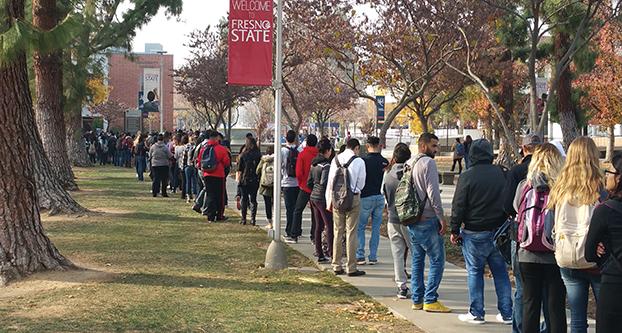Fresno State President Dr. Joseph Castro has announced to the campus community a new plan for the University Testing Center.
The new plan was announced to students through an email on Jan. 13, which stated the testing center will be open for the spring 2017 semester.
Castro said he appointed a task force in February 2016 to review the role of the testing services. The task force submitted its report to Castro in May 2016, which was shared with the Academic Senate.
Tracey Smith was brought in by Castro as a consultant in the fall of 2016 to meet with students, faculty and staff about the center. Smith submitted his report with his recommendations to Castro in November 2016.
“After a careful review of the reports by both the task force and the consultant that included feedback from students, faculty and staff and after thoughtful discussion with Provost [Lynnette] Zelezny and Vice President [Frank] Lamas, I am pleased to share with you a new plan for the future of the University Testing Center,” Castro said in the announcement.
Testing service operations will be split into two sections: the division of academic affairs and the division of student affairs and enrollment management.
Lamas, the vice president for student affairs and enrollment management, explained that different tests fit better with the different divisions and their missions.
Previously, students encountered many long lines at the testing center, which prevented them from taking exams in a timely manner.
“Part of the issue before was that the testing center has somewhere around 150 spaces, and there weren’t enough spaces to continually rotate people in and out taking the variety of tests,” Lamas said.
He said the administration is hoping to give most tests in the classroom, as opposed to the testing center.
Dr. Rajee Amarasinghe, chair of the department of mathematics, received feedback from math professors when the center closed.
Instructors were affected when the testing services halted, Amarasinghe said. They had to give tests in the classroom which lessened the students’ learning time in the classroom. When the services were running, professors had more time to teach, he said.
“[Instructors] used the testing time as a review, and then said, ‘You are free to go take the test,’” Amarasinghe said. “So the students, in that sense, they lost that review time. That is not good, particularly if it is a large lecture where students are struggling.”
Although professors now have less time to review the material, Amarasinghe said they have adjusted well to the changes.
According to the announcement, the division of academic affairs will offer two services: faculty exams and department exams.
Faculty exams will include exams for online and full classrooms, department-specific survey exams, early-take and makeup exams, summer school full classroom exams and extended-time disability accommodations.
Department exams will include the Medical Interpreting Exam, the U.S. Constitution Exam, the Calculus Readiness Test and the Upper Division Writing Exam.
The division of student affairs and enrollment management will offer four different services: professional certification and licensing exams, educational assessment and placement exams, Saturday paper-based testing and Saturday computer-based testing, according to the announcement.




